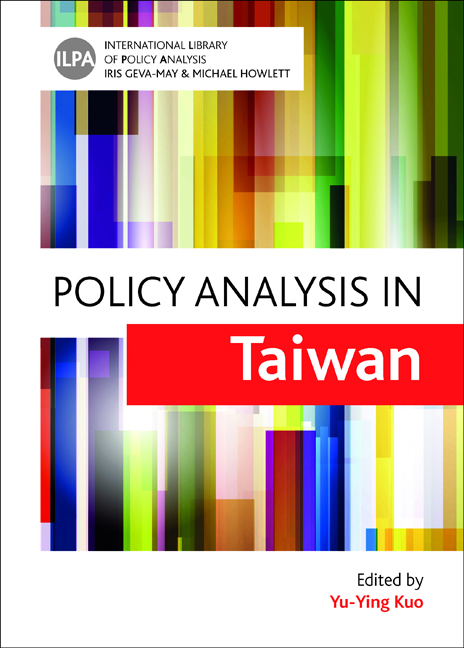Book contents
- Frontmatter
- Contents
- List of tables and figures
- Acknowledgements
- Notes on contributors
- One Policy analysis in a time of turbulence
- Two Exploring policy advisory committees in the central government
- Three Analysis of innovative local government policies in Taiwan
- Four Policy analysis in the legislative body: the legislative process of the Soil and Groundwater Pollution Remediation Act in Taiwan
- Five Policy analysis in the local councils
- Six Gendering policy analysis? The problems and pitfalls of participatory ‘gender impact assessment’
- Seven The power of influencing policies, or getting their share and more: interest groups in Taiwan
- Eight Think tanks in Taiwan
- Nine The development of public engagement in Taiwan
- Ten Social media and policy evolution in Taiwan
- Eleven Policy analysis by non-governmental organisations in Taiwan
- Twelve Policy network of universal healthcare reform in Taiwan
- Thirteen Public policy and administration research
- Fourteen Too critical to ignore? A tri-dimensional relationship examination of policy analysis internship in Taiwan
- Fifteen Policy analysis in Taiwan in an international perspective
- Sixteen Policy analysis education in Taiwan: a comparative perspective
- Index
Fifteen - Policy analysis in Taiwan in an international perspective
Published online by Cambridge University Press: 11 March 2022
- Frontmatter
- Contents
- List of tables and figures
- Acknowledgements
- Notes on contributors
- One Policy analysis in a time of turbulence
- Two Exploring policy advisory committees in the central government
- Three Analysis of innovative local government policies in Taiwan
- Four Policy analysis in the legislative body: the legislative process of the Soil and Groundwater Pollution Remediation Act in Taiwan
- Five Policy analysis in the local councils
- Six Gendering policy analysis? The problems and pitfalls of participatory ‘gender impact assessment’
- Seven The power of influencing policies, or getting their share and more: interest groups in Taiwan
- Eight Think tanks in Taiwan
- Nine The development of public engagement in Taiwan
- Ten Social media and policy evolution in Taiwan
- Eleven Policy analysis by non-governmental organisations in Taiwan
- Twelve Policy network of universal healthcare reform in Taiwan
- Thirteen Public policy and administration research
- Fourteen Too critical to ignore? A tri-dimensional relationship examination of policy analysis internship in Taiwan
- Fifteen Policy analysis in Taiwan in an international perspective
- Sixteen Policy analysis education in Taiwan: a comparative perspective
- Index
Summary
Introduction
Globalisation has become a necessary agenda item for policy arguments. Thus, infusing international elements into the description and prescription of policy analysis enhances understanding and evaluation of the policy's causes and effects. Globalisation has substantially influenced development in many countries, including Taiwan: with an area less than 0.03% of the world's land mass and a mere 0.4% of its population, Taiwan has grown into a high-ranked economic power and a leader in informational technology products and original equipment manufacturing (OEM). Faced with globalisation, Taiwan has adopted a strategy consistent with global trends of liberalisation, internationalisation, government and financial reforms. To gain an advantage in the world, Taiwan also follows the trends of ‘globalisation’ and learns from the experiences of other countries to modify its policies and thus promote the welfare of its people. The Taiwan government also emphasises international environments, and works to develop the people's ability to adapt to globalisation so that Taiwan can improve its competitiveness and play a more prominent role in the world.
This chapter focuses on policy analysis in Taiwan with an international perspective. That is, this research employs the PDCA (plan–do–check–act or plan–do–check– adjust) framework to look at the efforts in policy analysis by which Taiwan addresses global trends. For example, establishment of an international mechanism attracts foreigners to work and live in Taiwan and increases Taiwan's global competitiveness. In Taiwan, policy analysis is frequently applied to the government, education and journal publications. To present a clearer picture, we firstly employ ‘ProQuest Information and Learning’ to search the peer reviewed journals and publications on policy analysis in Taiwan from 1990 to 2012, including on general policy, environmental policy, health policy, economic policy and educational policy. A trend graph is used to elucidate these policy analysis issues. Then we look at some of the think tanks in Taiwan that play a vital role in promoting the internationalisation of policy analysis, and review the goals and developments concerning internationalisation among 34 departments related to public administration and policy of the Taiwan Association for Schools of Public Administration and Affairs (TASPAA). Some emerging policy issues (nuclear policy, health insurance policy, e-governance policy) are selected to narrate their development. All of these are expected to advance the knowledge of Taiwan's internationalised policy analysis.
- Type
- Chapter
- Information
- Policy Analysis in Taiwan , pp. 219 - 230Publisher: Bristol University PressPrint publication year: 2015



